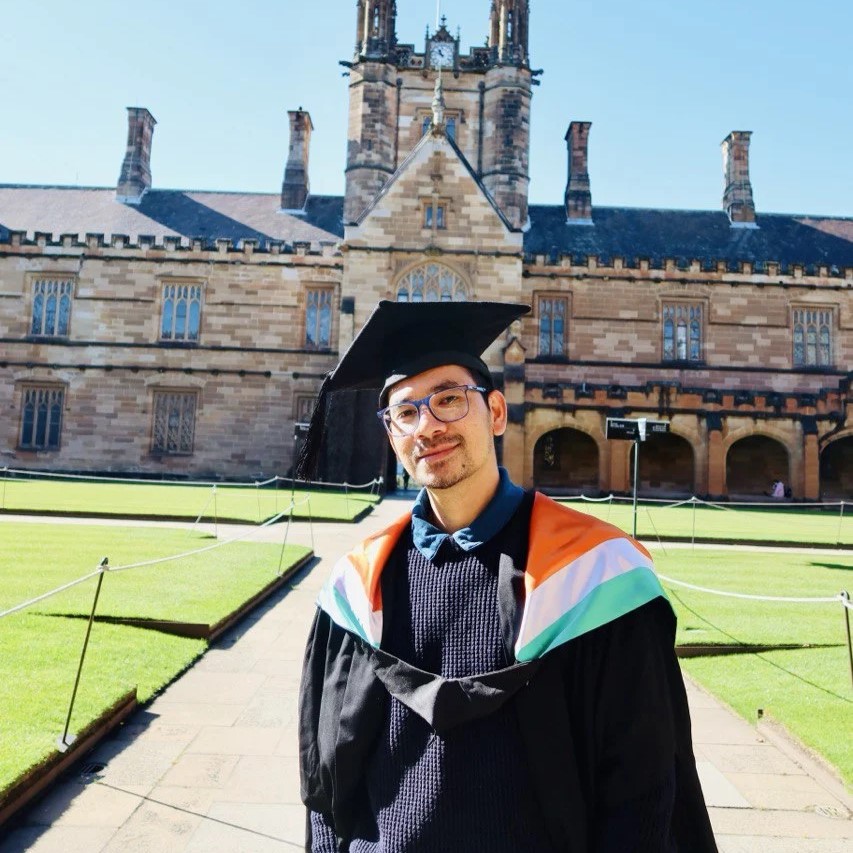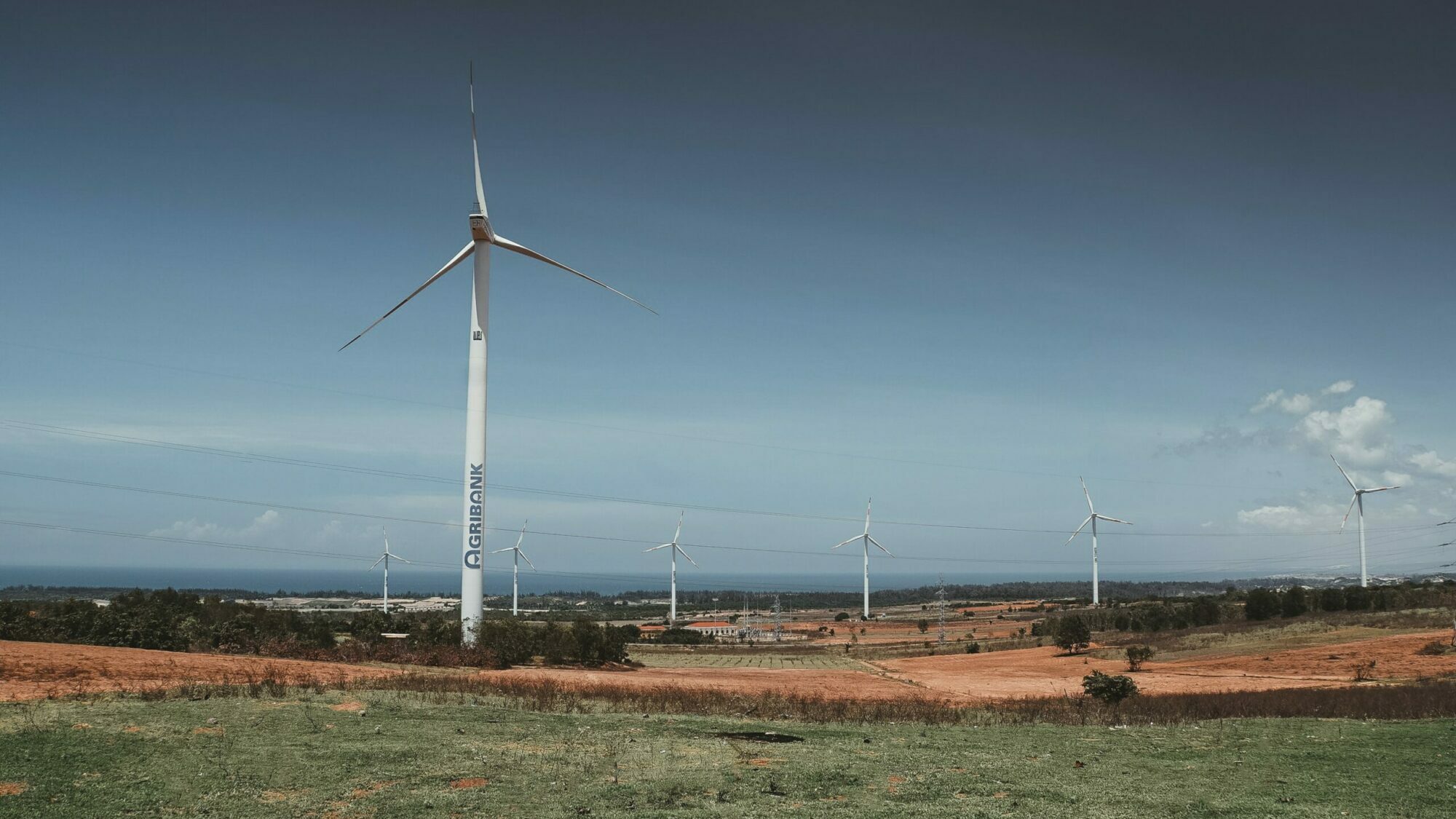
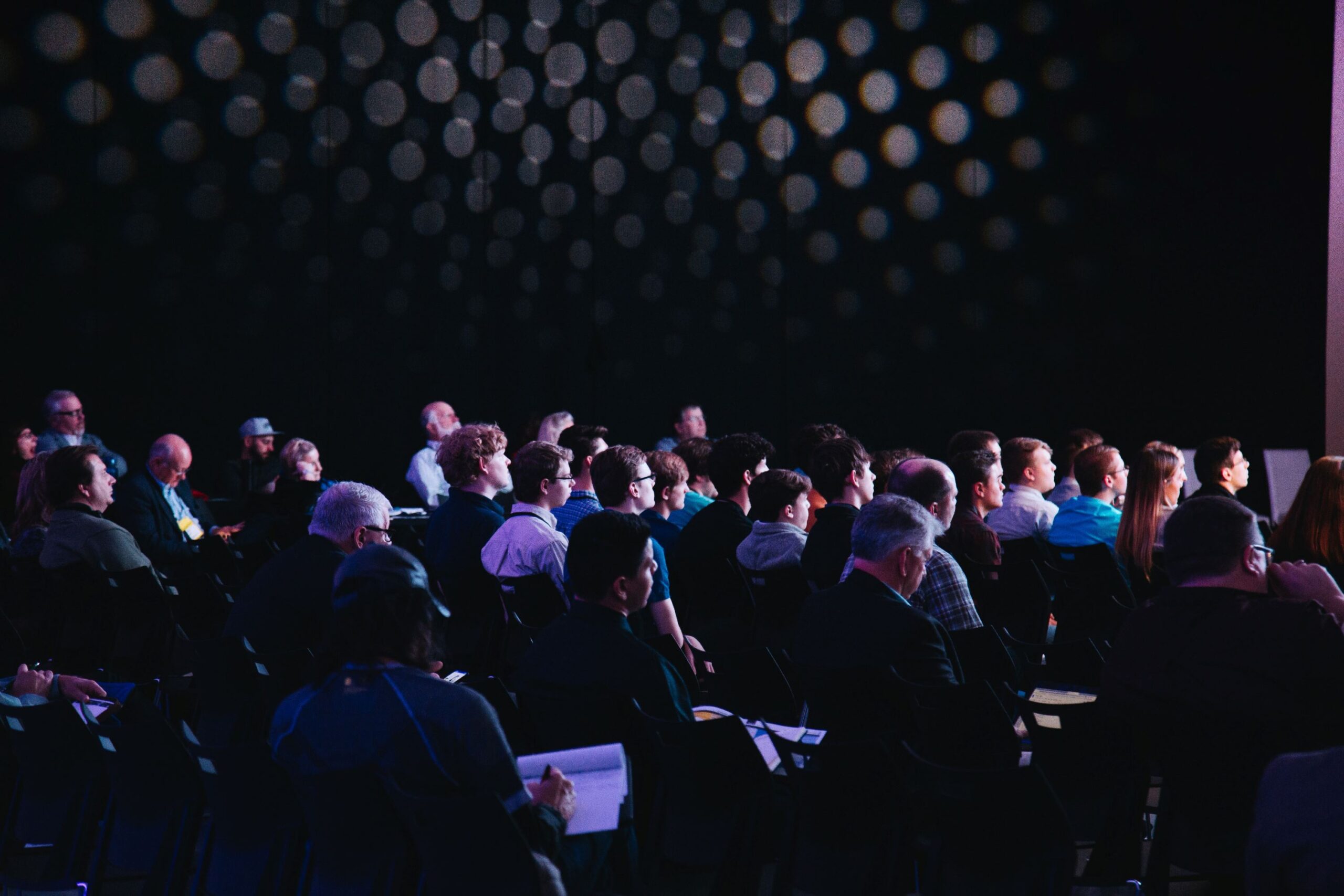
The AIEC is the leading conference dedicated to international education in Australia
Over 1,700 delegates representing more than 500 organisations came together in October to discuss challenges and future trends relevant to our industry, and highlight examples of best practice, all around the theme of ‘visionary and transformative’.
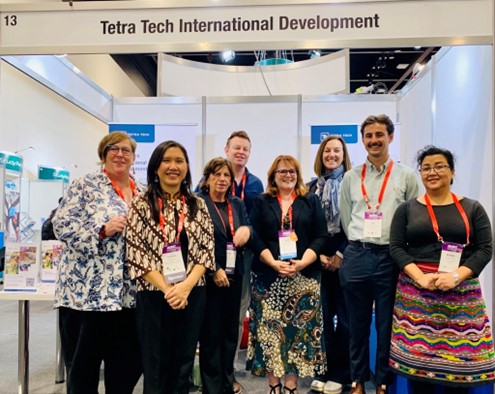
Pictured left to right, Tetra Tech International Development’s contingent: Alison White, Leliana Setiono, Annie Dares, Michael Boyle, Dr Vicki Vaartjes), Victoria Johnson. Jay Collins, Vim Dejvongsa.
AIEC has inspired Tetra Tech’s attendees and allows them to bring a wealth of innovations and ideas around international education in a post pandemic landscape to the work that Tetra Tech does. Four main themes emerged from our post conference interviews with our attendees:
Connectivity
Leli Setiono: On-Award Enrichment and Short Course Adviser, Australia Awards Cambodia, was a first-time attendee of AIEC. She notes ‘…it was wonderful to meet new contacts, share my passion in International Education, and to build connections and mutual understanding between Australia, Southeast Asia, and the Pacific. Mutual understanding is critical for working collaboratively to solve the pressing issues of our lifetime.’
One of the most inspirational sessions I attended was ‘Leveraging international education to leverage our international relations agenda’ by Joanna Shaw from LaTrobe University. She highlighted the importance of international education in soft diplomacy, arguing Australia should use it to foster strategic and diplomatic interests in the region. Many international students come from countries that are important for Australia’s foreign affairs, defence and trade, suggesting that international and domestic students should have more opportunities to interact and learn from each other while on campus, rather than relying on overseas mobility programs.
Joanna’s argument resonates with me. I believe that there is room to enhance the interaction between domestic and international students, especially those who are potential leaders in the countries that matter to Australia. This was a theme carried through other presentations as well, which specifically highlighted the importance of alumni networks: they are an asset and alumni interconnectivity is denser when they are involved in organised activities while studying in Australia.
Joanna Shaw’s presentation focused on the potential for soft diplomacy for the entire cohort of international students, regardless of whether they were financially supported in their studies. Through Tetra Tech’s management of the Australia Awards programs in ten countries, we intimately understand the two-way benefits of leveraging the networks and experiences of both current students and alumni. Our on-award engagement and enrichment activities and our ongoing connections with alumni focus on mutual benefit to the individual, to their communities, and to Australia.
Immediately before this session, Tetra Tech’s own Alison White curated and chaired an hour-long panel discussion on ‘Scholarships and national security, international development, and our strategic interests’. This session provided three very different perspectives on how Australia’s long history of international scholarships as a mechanism for both development and security informs, and is informed by, the Australian Government’s current strategy and goals.
Alison notes that there was an ‘interesting discussion around the personal agency, and choice, of scholarship awardees, highlighting that Australia is not the only game in town. Across our region, there are scholarship programs funded by various governments and organisations, all with their own objective. Engagement of scholarship recipients in their communities, both at home and abroad is crucial’.
Given the release of Australia’s International Development Policy earlier in the year, and the upcoming work on each country’s Development Partnership Plans, it was a most timely discussion.
Another session resonating with Leli was from two researchers presenting the ‘Transforming communities through development scholarships: Australia Awards evidence’.
“They provided a summary of evidence from the last 7 years from the Australia Awards Global Tracer Facility that showed how alumni have contributed to the Sustainable Development Goals. The ability for alumni to have an impact is significantly enhanced by the opportunities they have to begin building connections while in Australia. And the connections extend beyond individuals – being able to use Australia Awards Fellowships and Short Courses to build organisation-to-organisation partnerships further enhances connectivity and impact.
By creating a sense of cohort among scholars based on year group, field of study, activity-based interests, regional groupings, or cross-country initiatives such as the Australia Awards Women’s Leadership Initiative for Pacific scholars, we can foster stronger alumni interconnectivity and enhance their sense of connection to Australia.
There is an opportunity for us to have a more strategic approach to alumni engagement and on-award engagement programs, ensuring that they complement and reinforce each other. For instance, scholars’ participation in GEDSI events, such as the Women in Leadership (WIL) program, while on-award should be seamlessly integrated into the alumni WIL program.
Attending AIEC 2023 has reaffirmed the work that we have been doing in delivering the Australia Awards program to build human capacity in our closest neighbours and strengthening Australia’s relationship with South East Asia, the Pacific and beyond.
Alison White, Senior Fellow of the International Education Association of Australia, Associate Director, International Education at Tetra Tech, and AIEC program committee member, notes ‘It’s important to remember that this impact and influence is two-way – the passion, commitment and achievement of Australia Awards awardees has an equally inspirational impact on their Australian communities, host institutions and fellow students, and enables development of key people to people links, both within and external to any formal programs.
‘And, we know from our data that there is an increased number of mature-aged students. The well-being of students and their families is integral to the success of the awardee in Australia; supporting our awardees and their families is fundamental to our principles of supporting thriving people, thriving communities and a thriving planet.’
Best practice
Alison went on to comment that ‘…as a member of the AIEC Program Committee, I’ve been talking to lots of people about their experience at the conference. Whether attending for the first time (around 40% of attendees), or a seasoned AIEC delegate, what strikes me is the passion for our sector, and for our students, and the willingness of delegates to share their knowledge and experience. The level of engagement is truly inspiring and starts at the very top. The Opening Plenaries and Town Hall discussion on the Australian Strategy for International Education 2021-2030 on day 1 demonstrated that, as a sector, we aren’t afraid to consider contentious topics or ask the tough questions.
‘The level of engagement from government ministers (both Federal and State) all the way through the conference was very refreshing. The reputation of the sector is a high priority – and the question was raised ”do we need to prune the tree to save the tree?”. How do we protection the reputation of our sector, particularly in key risk areas such as those relating to education agents and VET providers which do not behave with integrity or in an ethical way? The robustness of the discussion was very refreshing – people were able to ask questions and acknowledge the challenges, celebrate the strengths, and discuss best practice and innovation.
The conference is very egalitarian – having all the thought leaders in one place, spanning government, marketing, communications, admissions, student life cycle, and more gives us all the opportunity to learn best practice from colleagues, share our own, and ask questions.
Victoria Johnson (Director, Education) commented that it was exciting to meet face to face with some of Tetra Tech’s tertiary education partner institutions and to hear about the great work that they are doing in supporting Australia Awards recipients and their families.
‘Australia has a lot to offer to South East Asia (SEA) in terms of skills development. The vocational education and training (VET) sector in Australia is generally well-regarded for its quality and relevance. However, the key challenge is to persuade the SEA countries of the importance and value of VET qualifications. The narrative should focus on how VET can equip people with the skills they need to face future challenges in the region and contribute to economic growth. The success of Aus4Skills in Vietnam, one of the programs Tetra Tech delivers on behalf of the Australian Government, should be celebrated and promoted. Working with the private sector with the support of the Australian government can be an effective way to engage the SEA countries.’
‘The question remains on how we can replicate the success of Aus4Skills across other South East Asian countries, and how Tetra Tech can play a key role in this by, say advocating to Australian embassies in the region for the inclusion of certain VET qualifications for Australia Awards, where appropriate. This would support the recommendation in Australia’s South East Asia Economic Strategy to 2040 to deepen its economic integration with the region by 2040.’
Climate change
Vimala Dejvongsa, Associate Director of Education at Tetra Tech, was particularly inspired by the discussions around climate change. Given Tetra Tech’s work in many countries that are facing the front-line impacts of climate change, the presentation ‘Elevating the climate conversation in the international education sector’ was particularly relevant.
Vim commented ‘I observed the push for improved sustainable practices being driven by the universities as they are committed to their overall sustainability and climate mitigation policies. The lessons gained from the speakers to garner support from their executives to commit to sustainability was valuable. These lessons were – establish a baseline of our carbon footprint and other metrics, use plain language and be conscious of excluding others through ‘jargon’, reduce conversations in silos – find champions and allies if needed, and embed climate change adaption and mitigation strategies.
‘I feel this is advice I can use within our organisation to further the discussion. Currently we have cross practice participation from myself in the Education team and members of the Scholarships and Climate Change teams – we all recognise the relevance of sustainability to our organisation and programs. Further, I’m interested in understanding how Tetra Tech’s overall sustainability program applies to international development, and how we might develop a framework for practical ways to reduce emissions, reduce plastic, and so on.
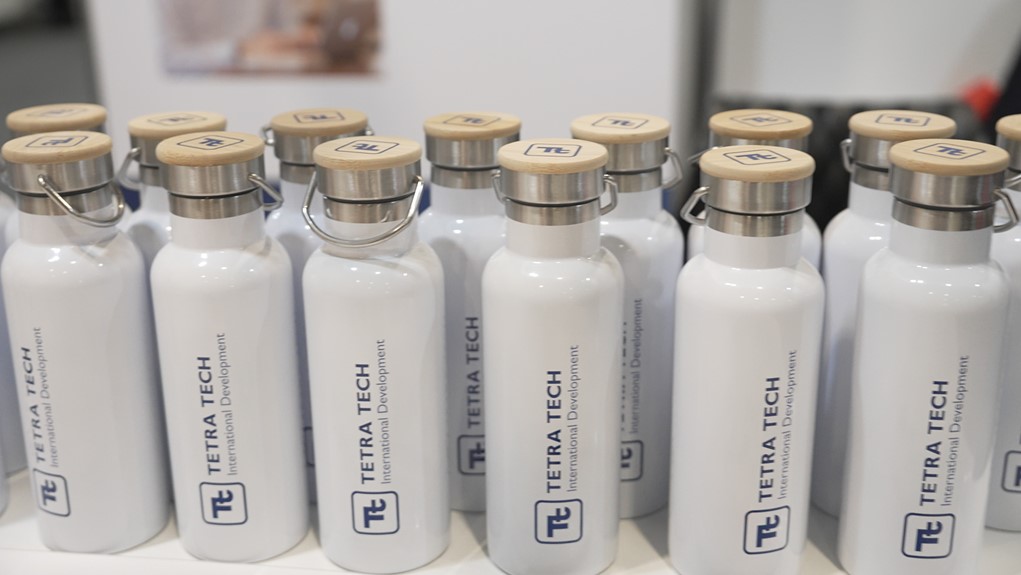
Tetra Tech Water Bottles at the AIEC
‘I was delighted that Tetra Tech was the water bottle sponsor for the event! It meant we were able to demonstrate how we’re really living our values as an organisation – one that is working hard to improve how we approach climate change and sustainability’.
Technology
Technology was another key theme of discussion during the conference. Not only because of the impact of technology post-COVID, but also in the way the conference itself was managed. The conference organisers used technology that allowed people to submit questions to speakers online, making it possible for everyone’s voice to be heard. Particularly when English is someone’s second or third language, or when they do not feel comfortable to ask a question in front of a room full of their peers – technology facilitated that.
In terms of the conference presentations themselves, Rod Sollesta, Tetra Tech’s Associate Director for Future Economies, found the session with Stan Grant and Ashley Fell (McCrindle) where they discussed the ‘Top trends shaping the future of international education’ particularly insightful. Among the themes discussed, technology was a key focus, and how technology can help us shape the future of international education.
‘Demography and technology are major considerations for the future economies practice. As a company we might want to think more about how we can ensure that technology is promoting inclusion as opposed to technology being an instrument for exclusion (for example, persons with disability or those in remote locations unable to access IT-based services such as application platforms)’.
Crucially, Tetra Tech does a lot of work to ensure we are using technology across a range of our service offerings (online courses, for example). It is important for us to ensure we’re using technology to promote inclusion’.
Dr Catherine Ball also discussed ‘A vision for the future: where technology and humanity converge’
Leli Setiono feels that ‘…with the rapid progress of many technologies, international education should be agile and nimble to prepare future global citizens, to use, manage, and regulate the technology so it will bring positive benefits.
‘The role of government and civil society is even more crucial to monitor and hold the private sector accountable in their technology development to ensure that it benefits our society instead of creating more issues, posing a danger to our values, or benefitting only a small number of people. Transparency in the algorithm/science behind the technology is imperative to provide checks and balances.
‘I think it is important for our scholars to get exposed to the discussion and debate in Australia about the future of technology and public policy to ensure they are well prepared to face these issues in their own countries. Here is where connectivity within and between the alumni network is crucial.
Vim Dejvongsa, Associate Director of Education for Tetra Tech summed it all up perfectly – ‘Seeing the breadth and depth of all the international education industry represented at AIEC2023 – from student associations, education providers, institutions, governments represented from all over the world and across Australia and private sector partners, underlies the vibrant, dynamic and significant industry we have in Australia and the truly transformative change that education offers to people, communities and nations!’
Read more about Education services at Tetra Tech International Development.





